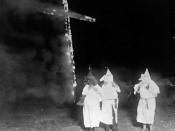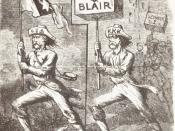Today, in the 1990's, citizens in our society are being bombarded with obscene material from every direction. From the hate lyrics of Gun's 'N Roses to the satanic lyrics of Montley Crue and Marilyn Manson to the sexually explicit graphical content of today's movies, the issue is how much society is going to permit and where we, as a society, should we draw the line. The freedom of speech has always been considered a right, but that doesn't mean that you can shout, 'Fire!' in a crowded movie theater. The real question is whether such material is harmful or dangerous to our society.
Many people are asking whether or not we should censor offensive material. They believe that some material is too obscene for society to hear or see. The advocates of censorship get riled up because the movie rating council doesn't give a move an R-rating for having the occasional f-word.
One rap group, 2 Live Crew, has already had one of their albums banned because in one song they used explicit references to male genitals and 87 references to oral sex. They used the word 'bitch' more than 100 times and the f-word more than 200 times.
Although most people agree that we are being overwhelmed with offensive material, there is no consensus on how to deal with the problem. There are three possible solutions. The first is the possibility of government censorship, which would include laws and penalties for breaking these laws. The second solution is self-imposed censorship by individuals and corporations. The third solution is total free speech with no censorship.
The first possible solution is government censorship. In the past government legal actions have been taken to control offensive messages. For example, in 1988, the Ku Klux Klan wanted to appear on a Kansas City,


